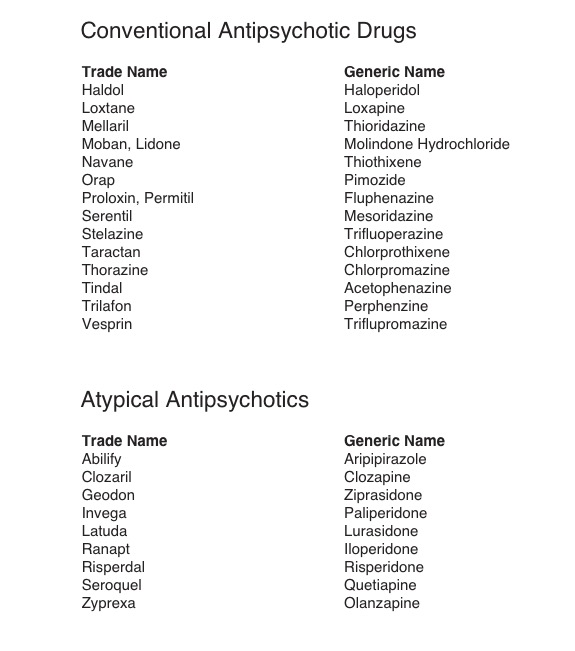|
|
Antipsychotic drugs developed in the 1950s revolutionzied the treatment for schizophrenia. These drugs eliminate many schizophrenia symptoms, and are nearly always a part of treatment. (Barnes & Marder, 2011) A number of drugs were produced during the 1960s through the 1980s that are referred to as conventional antipsychotic drugs that distinguishes them from recently developed “atypical” medications known as second-generation antipsychotic drugs.
Conventional Antipsychotic Drugs
Conventional antipsychotic drugs reduce psychotic sumptoms in part by blocking excessive production of the neurotransmitter dopamine. These drugs are also the cause of undesired movements similar to the disease itself. As a result, they are also called neuroleptic drugs. (Remington et al., 2011; Seeman 2011)
As with most drugs, conventional antipsychotic medications produce excellent results, reducing hallucinations and delusions seen in shizophrenia. On the negative side however, they can cause speech impairment as well as some loss of decision-making ability. In addition they can produce disturbing movements referred to as extrapyramidal effects. This term is given because of the drug’s effect on the extrapyramidal areas of the brain that help control motor activity.
These involuntary movements are very similar to the features of the neurological disorder Parkinson’s Disease. Approximately half of all patients taking conventional antipsychotic drugs experience muscle tremors and rigidity, with shaking, slow movement, feet shuffling (magnetic feet), and lessened facial expression. (Geddes et al., 2011; Haddad & Mattay, 2011)
Tardive Dyskinesia
Occasionally, undesired effects of these drugs manifest themselves as much as a year after first taking them, resulting in a a variety of involuntary facial and mouth movements. Patients fifty years of age and older are particularly at risk for these late reactions called Tardive Dyskinesia. The longer elderly people take conventional antipsychotic drugs the more unlikely their Tardive Dyskinesia will disappear on its own. (Julian et al., 2011)
Atypical Antipsychotic Drugs
The newer antipsychotic drugs referred to as “Atypical” antipsychotic drugs operate differently than conventional antipsychotic drug. They reduce the effect on dopamine production while reducing some but not all the undesired side effects. Atypical antipsychotic drugs also help people with Bipolar or other severe mental disorders.

This report is not a diagnosis. We hope this information can guide you toward improving your life.
Review our Knowledge Base or the links displayed on this page for similar and related topics.

